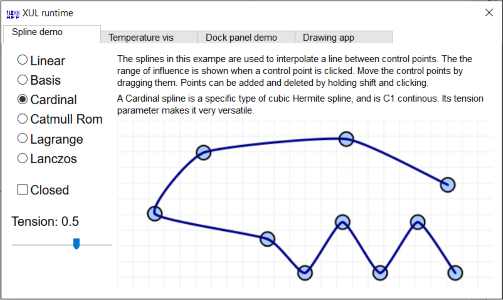https://github.com/flexxui/flexx
Write desktop and web apps in pure Python
https://github.com/flexxui/flexx
html5 python ui web
Last synced: about 2 months ago
JSON representation
Write desktop and web apps in pure Python
- Host: GitHub
- URL: https://github.com/flexxui/flexx
- Owner: flexxui
- License: bsd-2-clause
- Created: 2014-09-03T08:38:00.000Z (over 11 years ago)
- Default Branch: main
- Last Pushed: 2025-01-20T15:55:39.000Z (about 1 year ago)
- Last Synced: 2025-04-23T07:43:24.512Z (11 months ago)
- Topics: html5, python, ui, web
- Language: Python
- Homepage: http://flexx.readthedocs.io
- Size: 4.35 MB
- Stars: 3,324
- Watchers: 135
- Forks: 263
- Open Issues: 96
-
Metadata Files:
- Readme: README.md
- Contributing: CONTRIBUTING.md
- License: LICENSE
Awesome Lists containing this project
- awesome-python-web-frameworks - Flexx - Write desktop and web apps in pure Python (Front-end frameworks / More)
- awesome-list - Flexx - Write desktop and web apps in pure Python. (Desktop App Development / Python Toolkit)
- awesome-python-resources - GitHub - 19% open · ⏱️ 22.07.2022): (图形用户界面)
- best-of-python - GitHub - 19% open · ⏱️ 06.01.2024): (GUI Development)
- my-awesome-github-stars - flexxui/flexx - Write desktop and web apps in pure Python (Python)
- awesome-python - flexx - 2-Clause](https://api.github.com/licenses/bsd-2-clause)- Write desktop and web apps in pure Python (Awesome Python / GUI)
- starred-awesome - flexx - Write desktop and web apps in pure Python (Python)
README
Flexx
=====
[](https://github.com/flexxui/flexx/actions)
[](https://flexx.readthedocs.org)
[](https://badge.fury.io/py/flexx)
Want to stay up-to-date about (changes to) Flexx? Subscribe to the [NEWS issue](https://github.com/flexxui/flexx/issues/477).
Introduction
------------
[Flexx](https://flexx.readthedocs.io) is a pure Python toolkit for
creating graphical user interfaces (GUI's), that uses web technology
for its rendering. Apps are written purely in Python; The
[PScript](https://pscript.readthedocs.io) transpiler generates the
necessary JavaScript on the fly.
You can use Flexx to create (cross platform) desktop applications, web
applications, and export an app to a standalone HTML document. It also
works in the Jupyter notebook.
The docs are on [Readthedocs](http://flexx.readthedocs.io).
the code is on [Github](http://github.com/flexxui/flexx).
Example
-------
Click the image below for an interactive example:
[](http://flexx.readthedocs.io/en/latest/examples/demo_src.html)
Motivation
----------
The primary motivation for Flexx is the undeniable fact that the web
(i.e. browser technology) has become an increasingly popular method for
delivering applications to users, also for (interactive) scientific
content.
The purpose of Flexx is to provide a single application framework to
create desktop applications, web apps, and (hopefully someday) mobile apps.
By making use of browser technology, the library itself can be
relatively small and pure Python, making it widely available and easy
to use.
A word of caution
-----------------
Flexx is very versatile and
[can be used in different ways](https://flexx.readthedocs.io/en/stable/guide/running.html).
It also makes it easy to mix Python that runs on the server and Python that
runs in the browser. This is a powerful feature but this also makes it easy
to create code that becomes difficult to maintain. You, the developer, must
ensure that Python and PScript code are clearly separated.
Installation
------------
Flexx requires Python 3.5+ and also works on pypy. Further,
it depends on:
* the [Tornado](http://www.tornadoweb.org) library (pure Python).
* the [PScript](http://github.com/flexxui/pscript) library (a pure Python flexxui project).
* the [Webruntime](http://github.com/flexxui/webruntime) library (a pure Python flexxui project).
* the [Dialite](http://github.com/flexxui/dialite) library (a pure Python flexxui project).
To install the latest release (and dependencies), use either of:
```bash
# Install latest release
pip install flexx
# Install latest from Github
pip install -U https://github.com/flexxui/flexx/archive/master.zip
```
Or get the bleeding edge with:
* ``pip install https://github.com/flexxui/flexx/archive/master.zip``
Supported browsers
------------------
Flexx aims to support all modern browsers, including Firefox, Chrome and Edge.
Internet Explorer version 10 and up should work, but some things may be flaky.
For running desktop apps, it is needed to have Firefox or NW.js installed.
License
-------
Flexx makes use of the liberal 2-clause BSD license. See LICENSE for details.